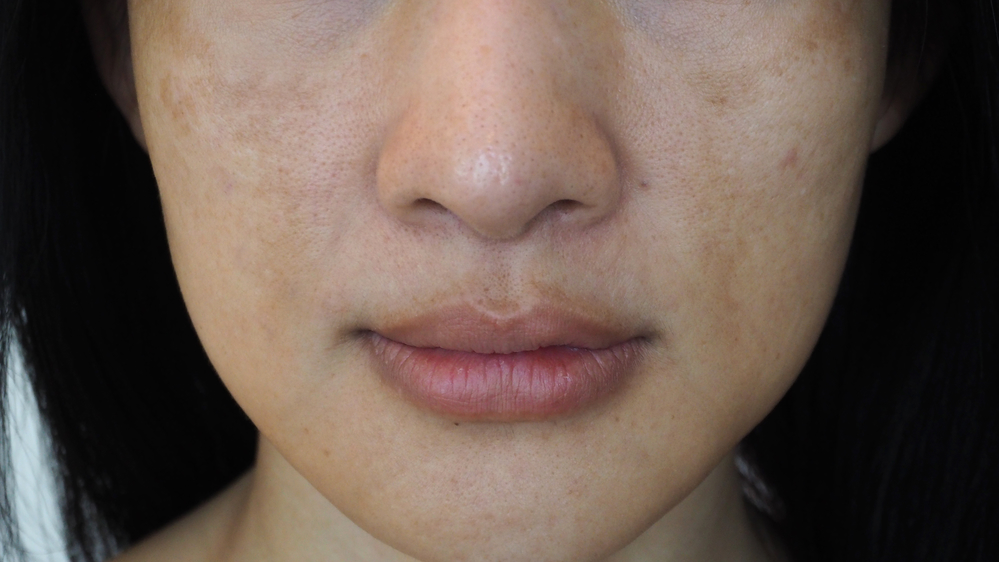
Melasma affects more than five million Americans annually, and the American Academy of Dermatology reports that women account for roughly 90% of those affected. It is a hormonal skin condition, but the exact cause is still being studied. Melasma does not fade naturally over time. In fact, it can actually worsen with sun exposure, but fortunately, there are several safe and effective treatment options to help in addressing the condition.
What Is Melasma?
Melasma is a dark skin discoloration that is caused by excessive melanin in the body. Found predominantly in women on sun-exposed areas of the face, the areas of the body that are most affected include the cheeks, forehead, chin, upper lip, and on the bridge of the nose. This very common skin disorder can be effectively treated with non-invasive skin treatments.
Who Is Most Often Affected?
Women with medium to darker skin tones are most affected by this skin disorder. Women experiencing hormonal fluctuations in pregnancy, or while taking contraceptive pills or hormone replacement therapy have a higher risk of developing this condition. The risk of developing melasma becomes even more significant for those over-exposed to sunlight, or whose skin has suffered chronic irritation from external sources such as chemicals, abrasion, or waxing.
What Does Melasma Look Like?
Melasma typically first appears as dark spots on the face that resemble sunspots or sun damaged skin. Later, it then develops into a more extensive mask-like coverage of the skin. The uneven brown-toned discoloration is found mostly on the cheeks, nose, lips, and forehead.
Is Pregnancy-Related Melasma Different?
Any changes in your hormones, whether from taking birth control or from being pregnant, can trigger melasma. Melasma during pregnancy is more commonly referred to as chloasma. While it will likely show in sun-exposed areas like on your face, occasionally, chloasma may show on the chest, arms, or hands. Studies show that 50-70% of pregnant women will experience some form of chloasma.
Is Melasma a Sign of Other Serious Skin Conditions?
Melasma is a cosmetic condition that is not linked to any other type of severe skin condition. As with any skin condition, you should be examined and diagnosed by your doctor to rule out any other possibilities.
Melasma will not:
- Cause you pain or discomfort
- Turn into skin cancer
- Become contagious
- Become infected
- Be triggered by contact with other allergens
Non-Invasive Treatment Options
While no single treatment has proved to be effective for all patients attempting to treat melasma, a combination is often tried to achieve optimum results. Laser Aesthetic Center will evaluate your melasma with a digital skin analysis to design a custom course of treatment for you.
PicoSure Focus
The latest treatment for skin pigmentation uses the PicoSure Focus laser to target brown spots through a “photoacoustic” process similar to tattoo removal. Other benefits of the PicoSure Focus includes overall skin rejuvenation, improved texture, reduced pores, and reduced fine lines and wrinkles. A series of treatments every two to four weeks is recommended until your melasma begins to improve.
Chemical Peels
Exfoliating the skin through chemical induced peeling can deliver certain skin benefits, including reversing melasma and breakouts. Chemical peels are a well-known modality of treatment for melasma by controlling the exfoliation and removal of superficial lesions, followed by the regeneration of new epidermal and dermal tissues.
Don’t Let Your Melasma Keep You From Enjoying Your Life
Treating melasma involves a combination of a home care regime and professional treatments. It’s essential to have patience when treating melasma, as it is not something that can be cured, and only treated. With a combination of daily use of broad-spectrum sunscreen, reducing your sun exposure, and Laser Aesthetic Center, together we can help control your melasma.
Call us today to schedule a complimentary consultation appointment where we can discuss treatment options with you.
